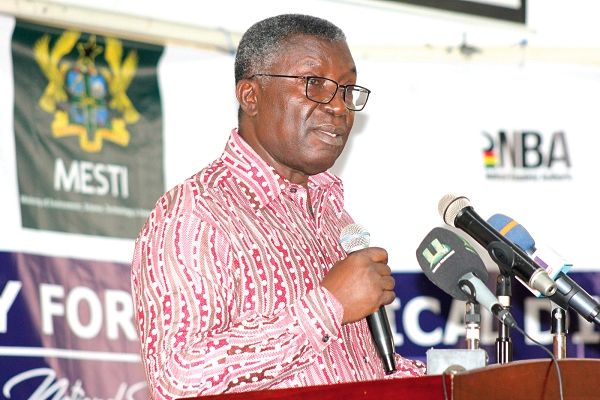
Ghana marks International Biological Diversity Day
Ghana yesterday joined the rest of the world to mark the 2019 International Biological Diversity Day with a resolve to enhance efforts to protect plant and animal life and species.
Marked globally on May 22, the International Day for Biological Diversity or World Biodiversity Day is a United Nations sanctioned international day for the promotion of biodiversity issues.
Advertisement
The commemoration falls within the scope of the UN Post-2015 Development Agenda's Sustainable Development Goals.
The 2019 celebration was held on the national theme: “Promoting our indigenous foods and medicines; a catalyst for achieving the Ghana beyond aid agenda,” while the global theme was “Our biodiversity, our food, our health."
This year’s national celebration which was marked with a forum at the Secretariat of the Ghana Academy of Arts and Sciences in Accra, sought to spread awareness of the dependency of the country’s food systems, nutrition and health on biodiversity.
The event brought together stakeholders such as researchers, academics, students, media, civil society organisations (CSOs) and representatives of the private sector.
Priority
Biodiversity Day prioritises the protection of plant and animal life in their neutrality; sustainable agriculture, desertification and degradation; drought, water and sanitation.
Other areas of focus include health and sustainable development; energy, science, technology and innovation; urban resilience and adaptation; sustainable transport, climate change and disaster risk reduction; oceans and seas and food security.
Shared responsibility
In his remarks at the commemoration, the Minister of Environment, Science, Technology and Innovation, Professor Kwabena Frimpong-Boateng, said the sustenance of human life and health was absolutely dependent on plant and animal life.
He said protecting biodiversity was a shared responsibility and called on everybody to to play their part in that direction, adding that the effort of the state in that respect included the preservation of water bodies, safeguarding the agricultural landscape and seascape and protecting the forest.
He explained that when biodiversity such as forests were destroyed or tampered with in any way and replaced, the replacement would not provide the required benefits like the original or natural vegetation.
He said globally, countries had witnessed the disappearance of a number of indigenous crop varieties and medicinal plants, with a corresponding decline in the essential knowledge of traditional medicines and local foods.
He said research had established that the loss of diverse foods was directly linked to disease or health risk factors such as diabetes, obesity, malnutrition and also had direct impact on the availability of traditional medicines.
“Ghana, as a State Party to the Convention for Biological Diversity, is equally challenged by the increasing taste for exotic food/medicines at the expense of our indigenous dishes and medicines," he said.
Ghana beyond aid
Prof. Frimpong-Boateng said as Ghana aspired to be a country developing beyond aid, there was the need for an integrated system to embrace the consumption of indigenous foods, medicines and other products.
"This can be achieved by conserving lands and water resources, safeguarding agricultural landscape for food production, as well as supporting traditional products such as food, medicines and clothing," he said.
The Ghanaian dream of delivering a green economy and the delivery of the sustainable development goals could not be achieved without depending on the rich indigenous foods and medicines, Prof. Frimpong-Boateng stressed.
The Director for Plant Genetic Resources Research Institution of the Centre for Scientific and Industrial Research (CSIR), Dr Lawrence Aboagye, for his part, said the institute had put in place measures to deal with the loss of certain crop varieties in the country to ensure food and medicine safety.
Traditional medicines
The General-Secretary of the Ghana Federation of Traditional Medicine Practitioners Association, Nana Kwadwo Obiri, complained that traditional medicine had been relegated to the background by the government.
He said although the government recognised the potency and role of traditional medicine and was promoting made-in-Ghana goods for economic development, it had failed to prioritise traditional medicine within the national healthcare system.
That, he said, had resulted in the advertisement of traditional medicines, which the state frowned on.
“We cannot be doing business in the dark. If medical practitioners are not allowed to prescribe our certified medication in the health facilities, then we will have no option but to advertise them,” he said.
Writer’s email [email protected]




